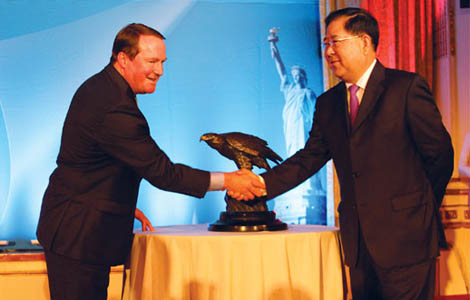Novel explores what might have been
Updated: 2014-08-08 12:47
By Amy He in New York (China Daily USA)
|
||||||||

In the opening of Ed Lin's novel Ghost Month, protagonist Jingnan learns some horrible news: his first love Julia has been murdered, shot in the head and left by the roadside.
She was killed during Ghost Month, the seventh month of the Lunar Year, when it is believed that the gates of the underworld open and spirits roam about freely, and the living have to placate the ghosts by mending their ways - at least for the month.
Ghost Month chronicles Jingnan's attempt to solve the mystery of Julia's murder at the behest of her parents, as well as cope with the doldrums of life in Taiwan, where Jingnan has returned after a short stint studying at UCLA.
Jingnan laments bitterly about how America could have been the gateway to something better - an American Dream he could have lived with Julia - but familial illness brought him back to Taiwan, leaving him in charge of the family restaurant.
One reason Lin wrote Ghost Month was to explore what life would have been like if he had been born in Taiwan, where his father's family had lived for generations, stretching all the way back to the collapse of the Ming Dynasty in the 1600s. The 45-year-old author purposefully named his main character after himself.
"This book is a really personal work," Lin told China Daily. "As a matter of fact, Jingnan is my name. I was just imagining what it would have been like if I had been born in Taiwan, and ended up continuing my parent's business."
In the novel, Lin's fifth - and first set in Asia, Jingnan derides the superstitious nature of the Taiwanese, who put so much stock in avoiding bad luck during Ghost Month, and how much more rational science-based Americans were.
"We loved America because it was the kind of place where religion and superstition didn't dictate the culture. The US president didn't burn incense to gods, bow down to idols in temples and worship his ancestors," the character Jingnan narrates.
Jingnan's discontent with his birthplace is a familiar one for Asian and Asian-American youth, Lin said in the interview. "In the way that I'm kind of imagining what a Taiwanese life is like, he is imagining what it's like to live in America. He thinks it's going to be so much better."
This attitude is an inverse of what it's actually like to be an Asian in America, and the reality is that being Asian American back when Lin was growing up in the 1970s was difficult, he said.
Lin was born in Queens, New York, but moved to New Jersey at a young age and lived in Pennsylvania for a short while before moving to New York for college. His family was one of a handful of Chinese families in most of the neighborhoods he lived in.
"When you're growing up as one of the few Asian Americans in your town, you can't help but feel that it's a handicap, right? As a young person, you just want to blend in, you don't want to stick out, you want to be able to have almost a certain kind of anonymity to things - just to go into a store and buy something and not having someone go, 'Hey Ching Chong!'" said Lin, who now lives in Brooklyn with his family.
As a student at Columbia University in the 1980s, Lin noticed that students from Taiwan, Hong Kong or the mainland would come to the US for a degree and try to establish themselves in America, just as Jingnan wanted to do.
But attitudes towards success and achieving that success as Asians have changed in the last few decades, Lin said, with people associating Asia as being a land of more opportunity than before.
"I sort of think if you're Asian now, you have certain advantages," he said. People now, Asians and Asian Americans alike, have no problem going to Asia for jobs and career expansion, he said.
For Asian-American writers - like himself, there are more Asian-American writers now than ever before. "Even 20 years ago, I could buy every single Asian-American book that was published. I had a whole crate. Every time there was an Asian American who published a book, I would put it in this crate," he said. "But now, I probably need a whole room. I can't even keep track of all the Asians who are publishing. And it's a lot of diverse stuff too - it's not like the same Chinese-American railroad story or a Japanese internment story."
Now, being called an Asian-American writer, Lin said, is a point of pride.
"I love being called an Asian-American writer," he said. "It's great!"
amyhe@chinadailyusa.com
(China Daily USA 08/08/2014 page2)
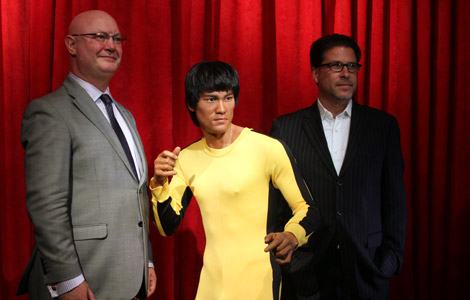
 Enter the dragon — the wax dragon
Enter the dragon — the wax dragon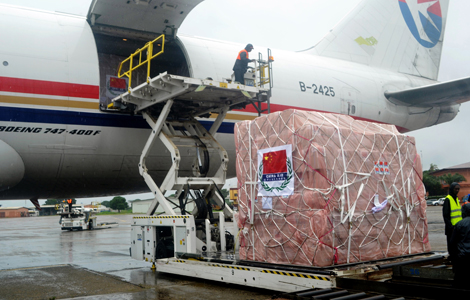
 Ebola collaboration urged
Ebola collaboration urged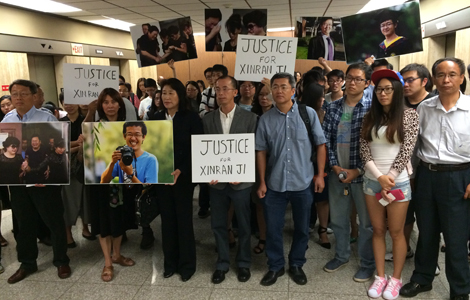
 Chinese rally at court for Ji
Chinese rally at court for Ji
 China's Napa Valley bid ripe for growth
China's Napa Valley bid ripe for growth
 Wanda's Hollywood premiere gets welcome
Wanda's Hollywood premiere gets welcome
 Sheriff official: Robin Williams killed himself
Sheriff official: Robin Williams killed himself
 Chinese warships visit US navy base after joint drill
Chinese warships visit US navy base after joint drill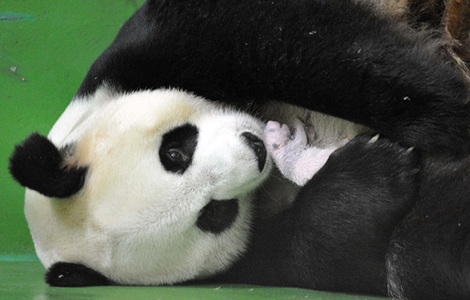
 Unique panda triplets take a bow
Unique panda triplets take a bow
Most Viewed
Editor's Picks

|

|

|

|

|

|
Today's Top News
Brazil presidential candidate Campos killed in plane crash
US Marine deployment raises brows
China, global markets spur Priceline deal
More than 1,000 auto firms probed
Chinese fans mourn beloved star
Deng TV series lifts the lid on key years
Futures consultants see future in China
Menlo Park VC invests in China's medical tourism
US Weekly

|

|
